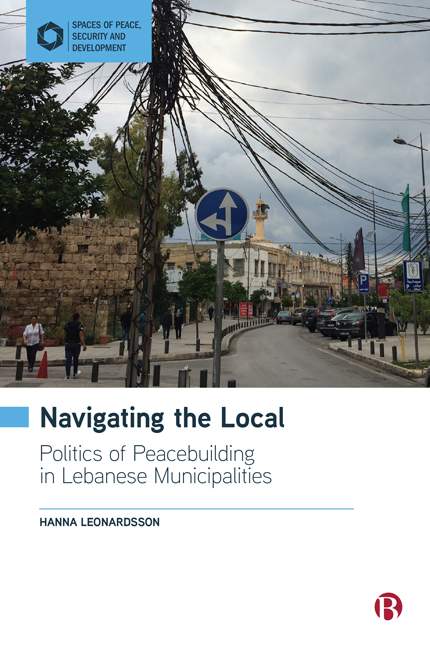Book contents
- Frontmatter
- Contents
- Acknowledgements
- Introduction
- 1 Theorizing Local Peacebuilding
- 2 Lebanese Municipalities, Centralized Peacebuilding and Possibilities for Change
- 3 Service Delivery: Providing for Local Needs
- 4 Local Interactions: Formal and Informal Everyday Interactions
- 5 Vertical Relationships: Connecting the Local to the National and Global
- Conclusion
- References
- Index
1 - Theorizing Local Peacebuilding
Published online by Cambridge University Press: 17 January 2024
- Frontmatter
- Contents
- Acknowledgements
- Introduction
- 1 Theorizing Local Peacebuilding
- 2 Lebanese Municipalities, Centralized Peacebuilding and Possibilities for Change
- 3 Service Delivery: Providing for Local Needs
- 4 Local Interactions: Formal and Informal Everyday Interactions
- 5 Vertical Relationships: Connecting the Local to the National and Global
- Conclusion
- References
- Index
Summary
In this chapter I elaborate on local service delivery, local interactions and vertical relationships and build an analytical framework for studying the role of local governments in local peacebuilding. The chapter is concerned with the notion that liberal peacebuilding has neglected local needs, alienated the population and centralized peacebuilding (Chandler, 2017; Debiel et al, 2016) and that local and decentralized approaches are a locus for legitimacy and locally relevant peace. As such, the chapter discusses local service delivery, arguing that providing for local needs is central to local legitimacy, which essentially promotes stability and peace. It discusses local interactions, crucial to ground peace in the everyday lives of the population, which make peacebuilding relevant for the population. And, it discusses vertical relationships, emphasizing that they matter for peace because they enable other developments, which, in turn, mitigate conflict.
In this book, peacebuilding entails ‘a range of efforts aimed at political, institutional, social, and economic transformations in post-war societies engaging a variety of actors … to reduce the risk of overt violent conflict and to pave the way for durable peace and development’ (Björkdahl and Höglund, 2013, p 291). This definition of peacebuilding is intentionally broad to incorporate the interconnectedness between issues that adhere to the fields of security as well as development (Stern and Öjendal, 2010) through a broad range of activities aimed at transforming society. These activities may, or may not, directly aim at preventing violence, and may produce expected and unexpected as well as counterproductive results. This is also at the heart of understanding service delivery, local inclusion and vertical relationships as peacebuilding functions, emphasizing how they perform rather than what form they take. Service delivery, local interactions and vertical relationships may seem mundane at first glance but are indeed relevant to everyday understandings of peacebuilding, through practices, performance and local expectations. This highlights the non-linearity of peacebuilding situated within local understandings of context, institutions and legitimacy, performed through politics.
Service delivery, local interactions and vertical relationships capture core ideas in the effective and emancipatory local peacebuilding debate (see Donais, 2012; Hancock and Mitchell, 2018; Lederach, 1997; Lemay-Hébert, 2019; Leonardsson and Rudd, 2015; Mcloughlin, 2015, 2019; Mitchell and Hancock, 2012). Of course, as a heterogenous scholarly debate, the literature expresses its central concerns through different terms.
- Type
- Chapter
- Information
- Navigating the LocalPolitics of Peacebuilding in Lebanese Municipalities, pp. 15 - 31Publisher: Bristol University PressPrint publication year: 2023



